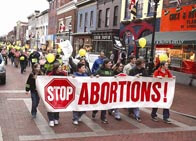ANNAPOLIS – Calling on lawmakers to bring an end to human cloning in Maryland, hundreds of prolifers from across the state converged on the capital March 12 for the 28th annual Maryland Candlelight March for Life.
Carrying bright yellow balloons emblazoned with the slogan, ‘Smile, your Mom chose life,’ the demonstrators marched from St. Mary in downtown Annapolis to the State House where they rallied on Lawyers Mall.
Participants said it was the moral duty of lawmakers to enact the Human Cloning Prohibition Act of 2007, a Senate bill sponsored by Southern Maryland Democrat Sen. Roy Dyson. Sen. Dyson is a parishioner of Holy Face Church in Great Mills.
Current law allows humans to be cloned for the purpose of scientific experimentation. The cloned embryos must be destroyed before the eighth week of development.
“We can do a lot of new things in science and the question is not whether we can, but whether we should,” said Sen. Andrew Harris, a Republican representing parts of Baltimore and Harford counties, who was the keynote speaker at the rally.
“What cloning does is take creation out of the hands of the creator and puts it in a laboratory,” said Sen. Harris, a Johns Hopkins medical doctor and a parishioner of St. Joseph, Cockeysville. “When we make other creators possible, watch out for those human rights that we have.”
Dr. David A. Prentice, senior fellow for life sciences at Family Research Council in Washington, warned that cloning amounts to the “manufacture of human life.”
“Cloning is the new slavery,” he said.
Human embryos should not be cloned and destroyed to harvest stem cells for scientific research, Dr. Prentice said. He noted that there are ethically sound alternatives to embryonic stem-cell research, such as research with adult stem cells, that do not require the destruction of human embryos.
Dr. Prentice emphasized that human cloning is not the same as in vitro fertilization. In cloning, no fertilization occurs – although an exact genetic copy of another person is created, he said.
In his homily at a Mass at St. Mary just before the start of the march, Monsignor Stuart W. Swetland, an administrator at Mount St. Mary’s Seminary in Emmitsburg, said prolifers are engaged in an ongoing struggle to change the tendency to divide humanity into persons and nonpersons.
“As a former embryo, I think we need to be respectful for who they are and not what they are,” he said. “If we say embryos are not persons, soon we’ll say the sick and elderly are not persons.”
Before he embraced the prolife position, Monsignor Swetland said he was once “radically pro-abortion.” It was through the prayers of friends he was converted, he said. The priest reminded prolifers they are called to treat opponents with charity.
Lisa Walk, a 22-year-old parishioner of St. Joseph in Sykesville, said she attended the march to “be a voice for those who don’t have a voice.”
Joyce Boyle, a parishioner of St. Francis de Sales in Salisbury, said she wanted to spread the message that “all life is sacred from conception until natural death.” Her doctor encouraged her to have an abortion when she was more than four months pregnant, she said. She refused and gave birth to a healthy baby.
“All life has value,” she said. “More people need to hear that.”


